NDO - When night falls, putting aside daily worries, many fathers and mothers in Sa Phin commune, Dong Van district ( Ha Giang ) call each other to go to school. They are illiterate people who are participating in the literacy class organized by Sa Phin Primary and Secondary Boarding School.
In the quiet night, surrounded by rocky mountains, the sound of reading echoed; rough hands familiar with growing corn and raising cows carefully wrote each letter and number. Those attending this special class wanted to learn to read, write, and calculate, thereby easily accessing knowledge, increasing their understanding to develop their family's economy , and escape poverty.
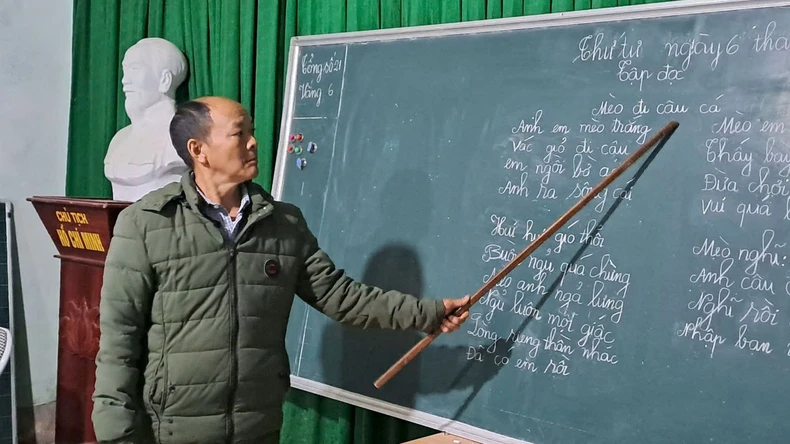 |
Teachers teaching literacy classes are fluent in both the common language and ethnic languages. |
Mr. Sung Chu Cho, Sa Phin commune, Dong Van district confided: “Before, I was illiterate, so it was difficult for me to do anything. Once, I went from Dong Van district to Ha Giang city. Because I was illiterate and could not speak Mandarin fluently, it was very difficult to catch a bus and find my way home. After attending this class for more than 7 months, I can write my name and understand what people write. I will not worry about going to work anymore because I know how to read.”
For Ms. Vang Thi Cho, 25 years old, Sa Phin commune, Dong Van district, although the literacy class is far from home, she still arranges her work to go to school every day.
Ms. Vang Thi Cho confided: "I used to go to primary school, but because I had not learned to read for a long time, and the village did not speak the common language, I became illiterate again. I want to study to learn to read and write, to calculate, and then go to the industrial zones in the lowlands to work."
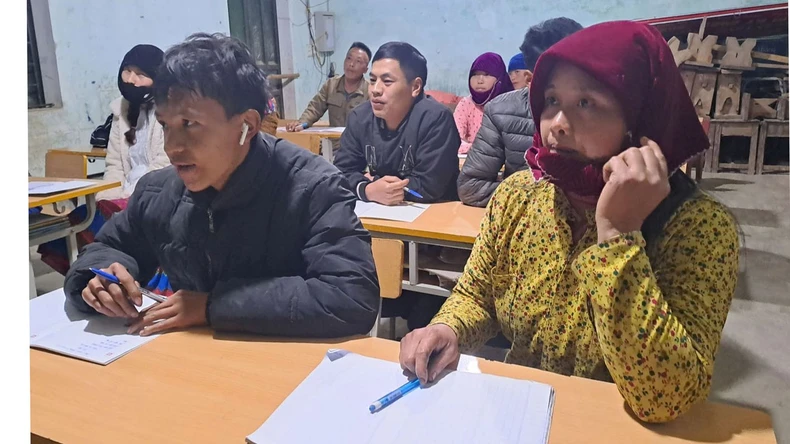 |
The older students pay attention to the lecture. |
The literacy class in Sa Phin commune has 21 students, aged 15 to 50, with class time from 7pm to 9:30pm every day of the week. Up to now, the class has lasted for more than 7 months, and most of the students have learned to read, write, and do basic calculations.
One of the most difficult things in organizing and maintaining literacy classes is motivating people to come to class and maintaining attendance.
Mr. Vang Mi Cay, a teacher at Sa Phin Primary and Secondary Boarding School for Ethnic Minorities, Dong Van District, said that when preparing to open a class, we went to the village and hamlet to coordinate with the village chief to go to each house to call people to join the class. People have not thought about going to school for a long time, so it was very difficult to persuade them. Village officials and teachers had to spend a lot of time and visit many times to persuade them to join the class.
“The difficulty does not stop at mobilizing students, but maintaining the class and the number of participants is even more difficult. Many people participate in the class without following the regulations, they go when they want to, and they quit when they don’t want to. Therefore, we have to ask the local government and the village chief to set clear regulations so that people do not skip or drop out of school,” Mr. Vang Mi Cay shared.
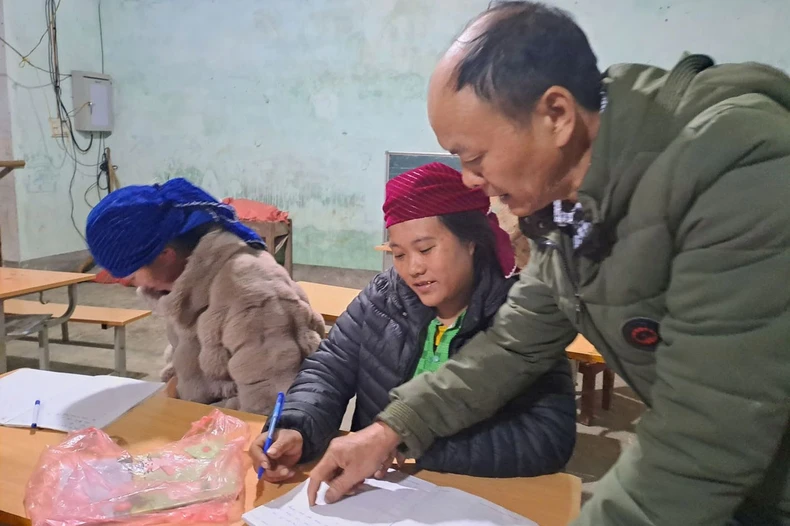 |
The teacher corrected each stroke of the handwriting for the older students. |
Dong Van district has more than 90% of its population being ethnic minorities, of which a large number of people aged 15 and over cannot read or write.
The main reason is that in the past, due to difficult economic conditions, children had to leave school early to help their families. In addition, most people in remote villages used the languages of ethnic minorities and did not often use Vietnamese in communication, leading to a re-illiteracy situation.
Faced with this situation and with support from the National Target Program for Socio-Economic Development in Ethnic Minority and Mountainous Areas, Dong Van District has implemented many specific solutions to eliminate illiteracy for the people. Therefore, not only the classes in Sa Phin Commune but also most of the communes in the district are organizing illiteracy eradication classes.
To carry out the work of universalizing education and eliminating illiteracy, the district has directed local authorities and schools in the area to review the number of people aged 15 and older who are illiterate again. After the review, the authorities coordinated with schools to organize illiteracy eradication classes. In addition, they mobilized cadres to go to villages and households to encourage people to go to school.
For the convenience of the people, literacy classes are held in the afternoon and evening; classes are also held at the school or village headquarters nearest to the people's homes. The arrangement of teachers to participate in literacy classes is also carefully selected by the schools. Most of the teachers who teach literacy classes have professional qualifications and experience, especially they must be fluent in two languages, which are the common language and the local language.
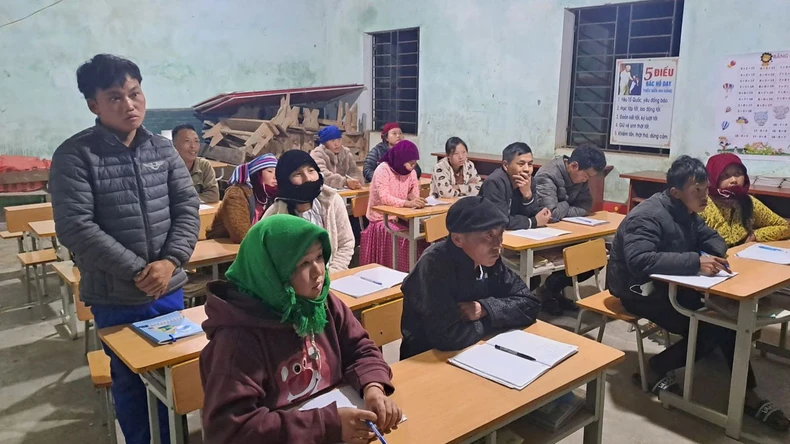 |
Literacy classes are taught in two languages so that students can understand and remember easily. |
Mr. Vang Mi Khanh, Vice Principal of Sa Phin Primary and Secondary Boarding School for Ethnic Minorities, said that in recent years, the school has coordinated with local authorities to organize many literacy classes. The school assigns literacy teachers who know the ethnic language, is flexible about time, combines many teaching methods to make it easier for students to absorb, and arranges teaching time in groups and classes.
Along with that is the flexibility to change the classroom layout, classroom space, use learning materials made from local agricultural products to teach math in stage 1 and use bilingualism (both common and ethnic languages) to teach to help learners feel close, easy to understand, easy to remember.
Source: https://nhandan.vn/lop-hoc-xoa-mu-tren-reo-cao-post848419.html






![[Photo] Prime Minister concludes trip to attend G20 Summit in South Africa](/_next/image?url=https%3A%2F%2Fvphoto.vietnam.vn%2Fthumb%2F1200x675%2Fvietnam%2Fresource%2FIMAGE%2F2025%2F11%2F24%2F1763944494358_vna-potal-thu-tuong-ket-thuc-chuyen-tham-du-hoi-nghi-thuong-dinh-g20-tai-nam-phi-8428321-4810-jpg.webp&w=3840&q=75)

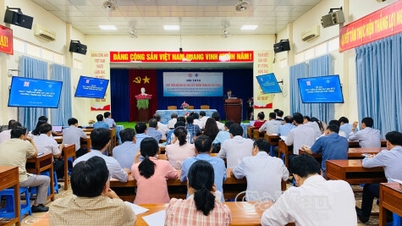

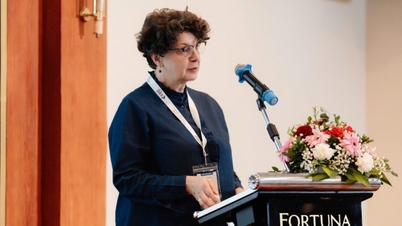





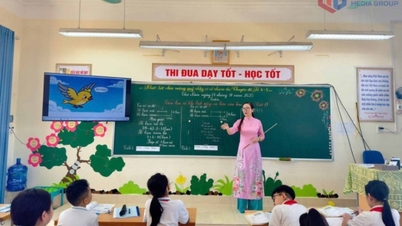

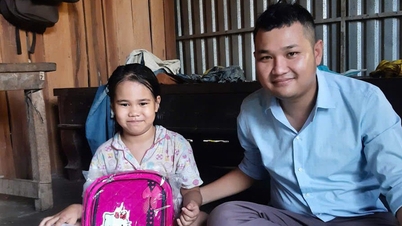

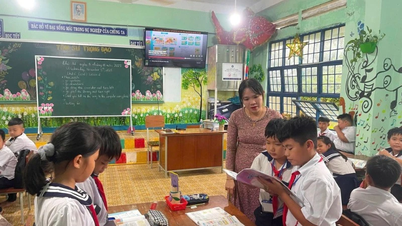







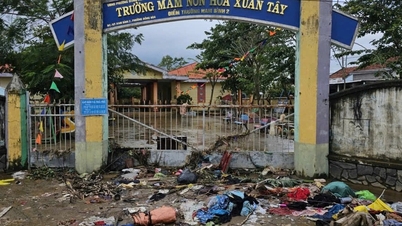




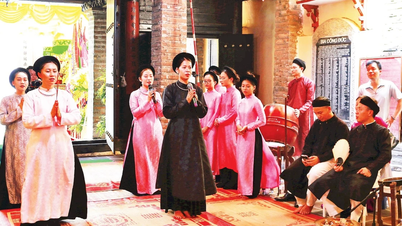
![[Photo] Prime Minister concludes trip to attend G20 Summit in South Africa](https://vphoto.vietnam.vn/thumb/402x226/vietnam/resource/IMAGE/2025/11/24/1763944494358_vna-potal-thu-tuong-ket-thuc-chuyen-tham-du-hoi-nghi-thuong-dinh-g20-tai-nam-phi-8428321-4810-jpg.webp)











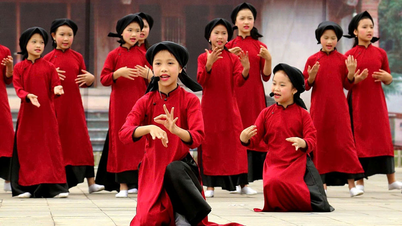



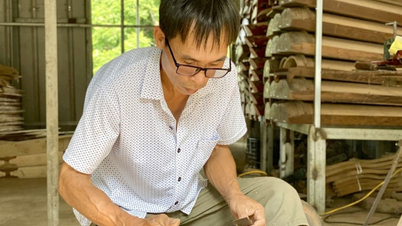



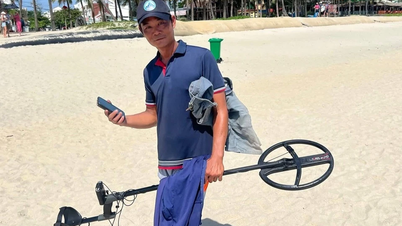



























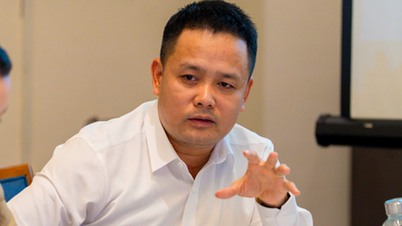






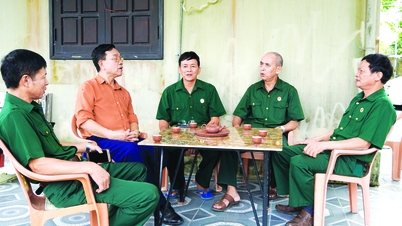



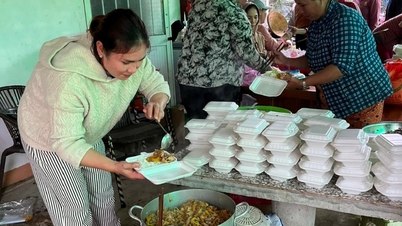
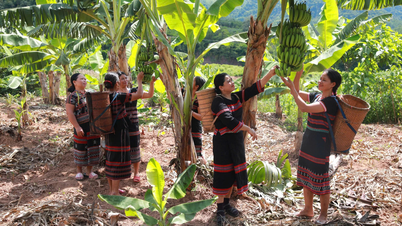














Comment (0)